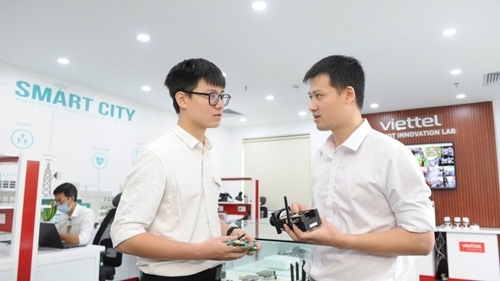The Law on Science, Technology and Innovation grants researchers broader rights, including intellectual property ownership, freedom to commercialise research, and greater autonomy in managing finance. It also commits the State will provide special incentives such as housing support, long-term career opportunities, and favourable conditions for both domestic and overseas talents who choose to work in Vietnam.
Meanwhile, the Law on Digital Technology Industry, passed in June 2025, recognises the sector as a key driver of economic growth. It prioritises the development of semiconductors, artificial intelligence ecosystems, and digital assets, with exceptional policies to support both enterprises and experts working in these cutting-edge fields.
    |
 |
|
Viettel engineers discuss technology solution development. (Photo: nhandan.vn) |
According to the Ministry of Science and Technology, follow-up decrees and circulars will soon be issued to guide the enforcement of these laws. These will ensure consistency with existing regulations while reducing administrative burdens that often discourage talents from long-term commitments.
Urgent need for top scientists
Deputy Prime Minister Nguyen Chi Dung recently stressed that many highly qualified Vietnamese experts are already contributing in leading universities, research institutes, and technology firms abroad. Some young Vietnamese scientists have returned home after studying overseas, making valuable contributions across sectors.
Still, he underlined the need for a more professional, dynamic research environment in Vietnam, where scientists are offered competitive salaries, modern facilities, and long-term career prospects.
Responding to this need, Party General Secretary To Lam has instructed ministries to quickly develop special incentives to attract at least 100 leading experts back to Vietnam. The Ministry of Science and Technology has been tasked with finalising a National Talent Attraction Strategy to 2030, with a vision to 2050, by September this year.
Former Minister of Science and Technology Nguyen Quan emphasised that in advanced areas such as space research, Vietnam must not only invest financially but also bring in world-class scientists if it hopes to reach its goal of becoming a high-income developed nation by 2045.
Echoing this, an expert from the US’s National Aeronautics and Space Administration (NASA) Dr. Nguyen Trong Hien remarked that while funding is crucial, giving researchers true freedom is equally important. “If Vietnam creates an open, supportive environment, it will be able to attract outstanding scientists from abroad,” he said.
Businesses also have high expectations. A representative of Viettel suggested that, in addition to financial support, policies should allow experts to co-own research outcomes, hold shares in spin-off companies, and enjoy tax incentives, alongside housing and welfare benefits.
Building fertile ground for innovation
To meet these expectations, the Ministry of Science and Technology is drafting detailed measures under the spirit of the Politburo's Resolution 57-NQ/TW that aims at driving breakthroughs in sci-tech development, innovation, and national digital transformation.
The ministry is also finalising a project on developing and promoting talents and high-quality human resources, with programmes to attract Vietnamese scientists abroad to work through special financial support, excellent research conditions and career development opportunities.
Along with that, investments will be allocated to upgrade research infrastructure, build international standard centres, high-tech zones, and technology incubators to create a favourable environment for creativity and innovation. Administrative barriers will be reduced, autonomy will be increased and adequate resources will be provided to ensure research and technology testing. The mechanism for evaluating the research process will also shift strongly to being based on output results such as international publications, patents, or commercialised products.
Source: VNA